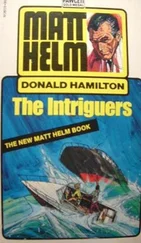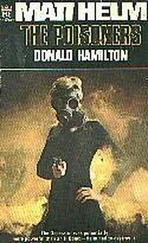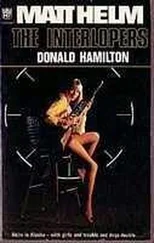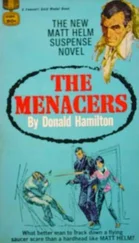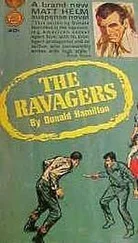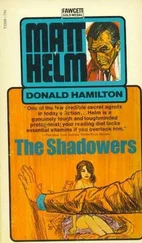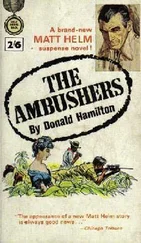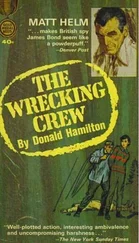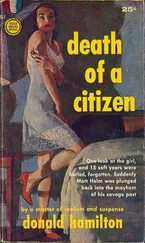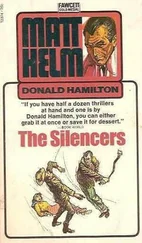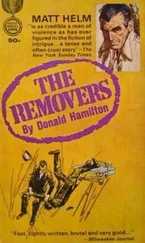Donald Hamilton - The Devastators
Здесь есть возможность читать онлайн «Donald Hamilton - The Devastators» весь текст электронной книги совершенно бесплатно (целиком полную версию без сокращений). В некоторых случаях можно слушать аудио, скачать через торрент в формате fb2 и присутствует краткое содержание. Жанр: Шпионский детектив, на английском языке. Описание произведения, (предисловие) а так же отзывы посетителей доступны на портале библиотеки ЛибКат.
- Название:The Devastators
- Автор:
- Жанр:
- Год:неизвестен
- ISBN:нет данных
- Рейтинг книги:4 / 5. Голосов: 1
-
Избранное:Добавить в избранное
- Отзывы:
-
Ваша оценка:
- 80
- 1
- 2
- 3
- 4
- 5
The Devastators: краткое содержание, описание и аннотация
Предлагаем к чтению аннотацию, описание, краткое содержание или предисловие (зависит от того, что написал сам автор книги «The Devastators»). Если вы не нашли необходимую информацию о книге — напишите в комментариях, мы постараемся отыскать её.
The Devastators — читать онлайн бесплатно полную книгу (весь текст) целиком
Ниже представлен текст книги, разбитый по страницам. Система сохранения места последней прочитанной страницы, позволяет с удобством читать онлайн бесплатно книгу «The Devastators», без необходимости каждый раз заново искать на чём Вы остановились. Поставьте закладку, и сможете в любой момент перейти на страницу, на которой закончили чтение.
Интервал:
Закладка:
In any case, I had the secret of Dr. Archibald McRow's super-bug. I also, no doubt, had the secret of the serum that would combat it-well, sixty per cent worth.
I turned to the outboard motor and yanked at the cord. Somebody was shooting at me from the shore; I'd drifted into sight of the cove. A boat was beached there, much larger than mine, piled high with cages, but the loading process had come to a standstill now. A couple of men were wading into the water toward me, trying to close the range. I yanked at the cord again, wishing I knew more about those lousy little two-cycle motors: it's a form of machinery with which I've had hardly any experience.
A burp gun opened up, and I heard the ricochets whine past, and saw the bullet-splashes move in my direction. Then the whole world seemed to tremble, and the cliff came down.
chapter TWENTY-FOUR
The face above me said, "I am terribly sorry, sir. About your friend. He sank before we could reach him."
"My friend?" My voice seemed to come from miles away.
"The man you were trying to rescue. There's no need to blame yourself, sir. You did your best. Now just hold still, please, while I bandage this gash on your shoulder. You are lucky to be alive. Your boat was smashed to kindling… Oh, just one question, sir. Was your friend carrying explosives of some kind? I mean, there was an odd underwater disturbance a minute or so after he went down…"
By this time I was aware that I was lying on the deck of a boat or small ship. I also could remember being hurled into the water and swimming, it seemed, miles with Basil's inert body, dragged downward by that damn metal box. Apparently it had been booby-trapped as I'd guessed, and the water-pressure had sprung the sides as it sank, setting off the charge. That took care of McRow's immortal contribution to science. It also took care of my contribution toward saving the world. That was up to other people now.
I said, "Colonel Stark.?'
"The Colonel is in the wireless shack, sir," said the man bandaging me. "I don't know just what you told him, but he wanted to get it on the air right away. He will be back shortly."
"There was a ship or submarine or something lying offshore."
"It has been taken care of, sir. There you are. A little rest and you'll be good as new, sir."
"Sure. Thanks."
I sat up and looked shorewards over the ship's low rail. Under the gray clouds, the shore had a different shape from what I remembered. Where there had been a headland of sorts, crowned by the remnants of Brossach Castle, there was now only a scar on the face of the cliff. I thought of Les Crowe-Barham, and of Vadya. Then I thought, for some reason, of the big Highland ox. I hoped he, at least, had escaped.
Footsteps came briskly along the deck, and I turned to see a stocky, gray-haired man in tweeds, with a fierce gray moustache. I had no doubt this was Colonel Stark, and I had a pretty good idea, having been through similar situations before, of the kind of elaborate official routine he'd put me through now. The only consolation was that I was going to have the fun of telling him that he'd have to quarantine this whole ship, himself included, until it was determined just how contagious I was.
It was two weeks before I was pronounced safe to associate with the human race again, after having so many samples taken of me that for a while it seemed likely there'd be nothing left. I was glad to see that an American doctor had been invited to participate in the experiments. Otherwise, I'd have had to rush to offer my unique plague-proof blood to my own country after the British got through analyzing it. As it was, I felt justified in getting off by myself for a day, to sort out a few uncomfortable thoughts I hadn't been able to deal with while serving as a scientific specimen.
They'd given me back the little red car, which they'd found somewhere and had tuned and filled with gas- excuse me, petrol. I thought that was pretty nice of them. I drove away from Glasgow through the usual Scottish drizzle and, after getting lost a couple of times, managed to locate a small village named Daibright. I parked outside the churchyard and went in through the iron gate.
The rain had stopped, but the place was dripping wet. There seemed to be nobody around. The little white church was shut up tight. I walked around slowly, examining the gravestones. Every fourth one, approximately, was a Glenmore. Back in the corner stood a large memorial monument dedicated, apparently, to family members who'd once been buried elsewhere and then dug up and re-interred here by someone who felt the family spirits should spend eternity together. Here I found the gentleman of whom I'd been told, who'd been beheaded for spying for the wrong side, or for being caught at it; I also found one who'd died in a duel. I couldn't help thinking that, while we don't have many dealings nowadays with the dueling sword or pistol, or the headsman's axe, we still seem to find interesting ways of getting ourselves killed.
It gave me a guilty, regretful feeling to stand there alone. I remembered a girl who'd died in London who'd have liked very much to see this. Then I heard the gate creak, and I looked around and thought a ghost had come alive. I mean, it was a girl, and she was wearing a sweater and the blue-and-green hunting tartan: a kilt-skirt closed by a big safety pin.
I stood quite still, watching her close the gate carefully, a little awkward because of the flowers she carried. Then she turned toward me. It was not Nancy Glenmore, of course. This was another girl, not quite as pretty, but with that fresh look they have up there. She gave me a questioning glance, and went on to a new grave near the church, and began to arrange her flowers carefully before
I hesitated. I mean, it would not have been difficult to strike up a conversation. A question about the family would have done it. She was obviously a distant relative, or she would not have been wearing the plaid. And I was certified safe by the doctors of two countries; I was definitely not contagious, plague-wise. Nor was anybody, to the best of my knowledge, interested in shooting at me at the moment; there should be no risk from stray bullets.
Still, she looked like a nice kid, and I did seem to leave a lot of dead people behind me, one way or another.
I walked quickly back out to the roadster and drove to an inn for breakfast, having passed up the ship's food that had been offered me. I bought a paper from a machine in the doorway. I had not, of course, been informed of what had happened up north after I'd left, or what measures had been taken. Security had been very tight, and I was, after all, a foreigner. Besides, Colonel Stark hadn't like me very much. He'd made it quite clear that while, officially, he was aware that I'd made a valuable contribution by escaping alive, personally he'd have thought more of me if I'd died fighting bravely at Crowe-Barham's side. Well, he was entitled to his opinion.
Waiting for my food, I read the paper carefully. It mentioned no strange diseases. There was, however, one small item about a question being asked in the House of Commons or wherever they ask those questions, concerning the accident that had totally destroyed a secret atomic installation, previously unheard of, on the northwest coast of Scotland, near the tiny village of Kinnochrue. I closed the paper thoughtfully. Apparently they'd used a low-yield nuclear device for extermination purposes, maybe one of the tactical gizmos. It could have done the work. Maybe I could stop feeling guilty about not being able to swim well enough to keep afloat Basil's body and the burden attached to it…
Six hours later I was in London. My instructions, transmitted through international channels, were to check back into Claridge's, where the room was still being held for me. A code word slipped into the text told me that the room and phone were now safe for conversation. This meant, I figured, that our own people wanted the answers to a few questions they had not been able to ask while I was in British hands. I didn't particularly look forward to another interrogation, so it wasn't with any great eagerness that I turned the Spitfire over to the doorman, got the key from the desk, and went upstairs, limping a little. Ironically, after all the exotic things that had happened to me, the wrenched knee I'd got stepping into a hole in the ground was the only thing that still bothered me, physically speaking.
Читать дальшеИнтервал:
Закладка:
Похожие книги на «The Devastators»
Представляем Вашему вниманию похожие книги на «The Devastators» списком для выбора. Мы отобрали схожую по названию и смыслу литературу в надежде предоставить читателям больше вариантов отыскать новые, интересные, ещё непрочитанные произведения.
Обсуждение, отзывы о книге «The Devastators» и просто собственные мнения читателей. Оставьте ваши комментарии, напишите, что Вы думаете о произведении, его смысле или главных героях. Укажите что конкретно понравилось, а что нет, и почему Вы так считаете.

